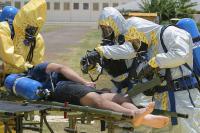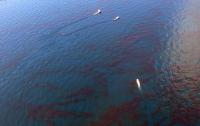-
Factors influencing the timing of infectious disease outbreaks
The delay between the time when a disease outbreak becomes possible and when it actually happens depends chiefly on how frequently infection is introduced to the population and how quickly the number of cases caused by a single individual increases, according to new research. The research lays the theoretical groundwork for a disease forecasting system that could give public health officials time to prepare for-or possibly even prevent-certain outbreaks in the future.
-
-
Bacteria-infected mosquitoes to combat Zika spread in South America
Mosquitoes infected with naturally occurring Wolbachia bacteria will be released in large urban areas in Colombia and Brazil. The new field trials will assess the effectiveness of the method for reducing new cases of Zika and other mosquito-borne diseases. Transferring the bacteria into Aedes mosquitoes reduces their capacity to transmit viruses to humans.
-
-
Shark antibodies for chemical, biological threat detection, treatment
New research shows that shark antibodies offer new alternatives to chemical and biological threat detection and treatment tools. In an era of Department of Defense belt-tightening, the goal is to find more innovative, cost-effective approaches to protecting our warfighters.
-
-
Funding for broad spectrum prophylaxis, treatment for bioterrorism threats
The U.K. Defense Science and Technology Laboratory (DSTL) has received funding of up to $6.9 million from the U.S. Defense Threat Reduction Agency (DTRA) for a program entitled “Inhalational ciprofloxacin for improved protection against biowarfare agents.” The inhalational ciprofloxacin formulations used in this program are Aradigm’s proprietary investigational drugs Pulmaquin and Lipoquin.
-
-
Texas must reduce nonmedical exemptions to vaccinations
In Texas, approximately 45,000 nonmedical exemptions were filed across all age groups during the 2015-16 school year, a record high in the last decade and a figure that is only increasing. Vaccines are one of most cost-effective public health measures, the authors of a new study write, and Texas should make the process of obtaining nonmedical exemptions more rigorous to avoid the public health risks and costs associated with preventable diseases.
-
-
Combatting antibiotic resistance
CDC has awarded more than $14 million to fund new approaches to combat antibiotic resistance, including research on how microorganisms naturally present in the human body (referred to as a person’s microbiome) can be used to predict and prevent infections caused by drug-resistant organisms. The initiative, which also provides funding for state health departments and other partners, implements the tracking, prevention, and antibiotic stewardship activities outlined in the National Action Plan for Combating Antibiotic-Resistant Bacteria.
-
-
Developing tests for radiation absorbed in nuclear emergency
In a large-scale nuclear or radiological emergency, such as a nuclear detonation, hundreds of thousands of people may need medical care for injuries or illness caused by high doses of radiation. To help save as many people as possible and better prepare the nation for the health impacts of such catastrophic emergencies, HHS will sponsor late-stage development of two tests, known as biodosimetry tests, which can determine how much radiation a person’s body has absorbed.
-
-
HHS bolsters U.S. health preparedness for radiological threats
The U.S. Department of Health and Human Services’ (HHS) Office of the Assistant Secretary for Preparedness and Response (ASPR) says that as a part of its mission to help protect Americans’ health following even the most unthinkable of disasters, it is purchasing two medical products to treat injuries to bone marrow in victims of radiological or nuclear incidents. Bone marrow is essential to producing blood.
-
-
Ambitious Baltimore water pollution clean-up project
Baltimore’s Inner Harbor and the urban rivers that flow into it are important sources of water to Chesapeake Bay, popular recreation sites for residents and tourists, and the targets of an ambitious clean-up plan to make the harbor swimmable and fishable by the year 2020. In a first for Baltimore and the nation, the U.S. Geological Survey and the Environmental Protection Agency will soon be installing a suite of sensors that will provide the public and scientists with the first comprehensive, real time look at water quality in Baltimore’s Inner Harbor.
-
-
A military view on climate change: It’s eroding our national security and we should prepare for it
U.S. military leaders and defense planners have been studying climate change for years from a perspective that rarely is mentioned in the news: as a national security threat. And they agree that it poses serious risks. Here is how military planners see this issue: We know that the climate is changing, we know why it’s changing, and we understand that change will have large impacts on our national security. Yet as a nation we still only begrudgingly take precautions. The next president will have a choice to make. One option is to continue down the path that the Obama administration has defined and develop policies, budgets, plans, and programs that flesh out the institutional framework now in place. Alternatively, he or she can call climate change a hoax manufactured by foreign governments and ignore the flashing red lights of increasing risk. The world’s ice caps will not care who is elected or what is said. They will simply continue to melt, as dictated by laws of physics. But Americans will care deeply about our policy response. Our nation’s security is at stake.
-
-
Strengthening U.S. infrastructure to withstand disasters
The delivery of essential services — whether in food, water, health, or emergency response — relies increasingly upon a complex, interconnected system of critical infrastructure. Ensuring these interdependent systems continue to operate during disasters and other disruptive events is crucial to maintaining public health and safety. NSF announces $22.7 million in new investments to promote better understanding and functioning of these infrastructures in an effort to improve their resilience.
-
-
A nerve agent antidote taken before a chemical weapons attack

Nerve agents are molecular weapons that invade the body and sabotage part of the nervous system, causing horrific symptoms and sometimes death within minutes. Few antidotes exist, and those that do must be administered soon after an attack. Now, scientists an early-stage development of a potential treatment that soldiers or others could take before such agents are unleashed.
-
-
New technology pinpoints water contamination sources

When the local water management agency closes your favorite beach due to unhealthy water quality, how reliable are the tests they base their decisions on? As it turns out, those tests, as well as the standards behind them, have not been updated in decades. Now scientists have developed a highly accurate, DNA-based method to detect and distinguish sources of microbial contamination in water.
-
-
Slowing the spread of infectious diseases
Outbreaks of infectious diseases such as Zika increasingly threaten global public health. Scientists expect five such new diseases to emerge each year. To find out whether our interaction with the environment is somehow responsible, the Ecology and Evolution of Infectious Diseases (EEID) program — a joint effort of the National Science Foundation (NSF), National Institutes of Health (NIH), and the U.S. Department of Agriculture (USDA) — has awarded $16.6 million in new grants. The scientists receiving the grants will study disease transmission among humans, other animals, and environment.
-
-
Florida tightens public notification rules for pollution incidents
Last week Governor Rick Scott instructed Florida Department of Environmental Protection (DEP) Secretary Jon Steverson to issue an emergency rule that establishes new requirements for public notification of pollution incidents. The rule is to take effect immediately. Scott issued the instruction following the sewage spill in Pinellas County and the sinkhole at Mosaic’s New Wales facility.
-
More headlines
The long view
Ransomware Attacks: Death Threats, Endangered Patients and Millions of Dollars in Damages
A ransomware attack on Change Healthcare, a company that processes 15 billion health care transactions annually and deals with 1 in 3 patient records in the United States, is continuing to cause massive disruptions nearly three weeks later. The incident, which started on February 21, has been called the “most significant cyberattack on the U.S. health care system” by the American Hospital Association. It is just the latest example of an increasing trend.
